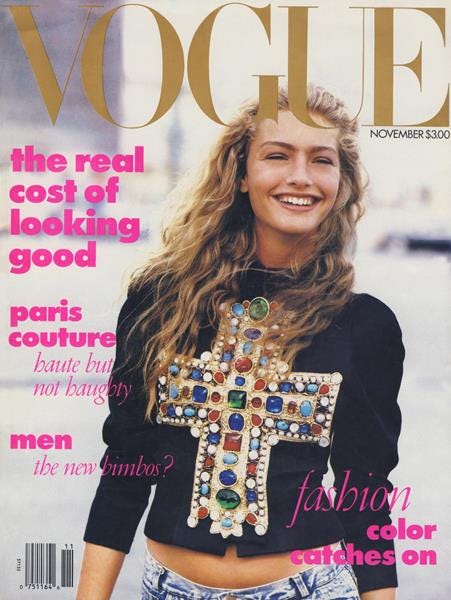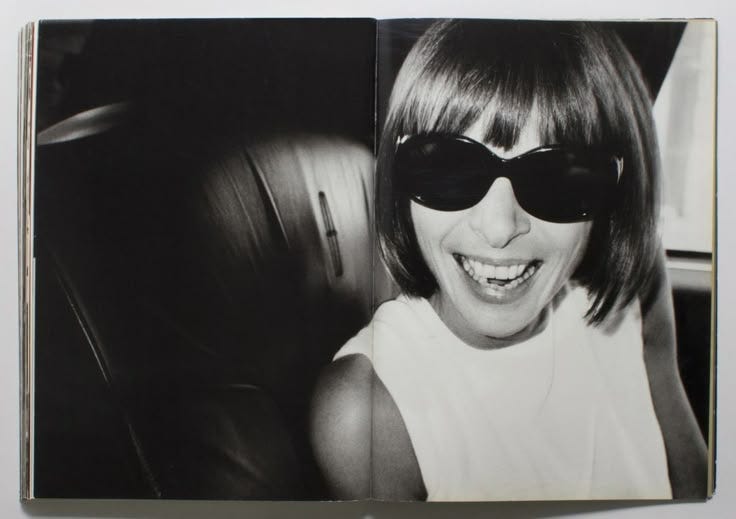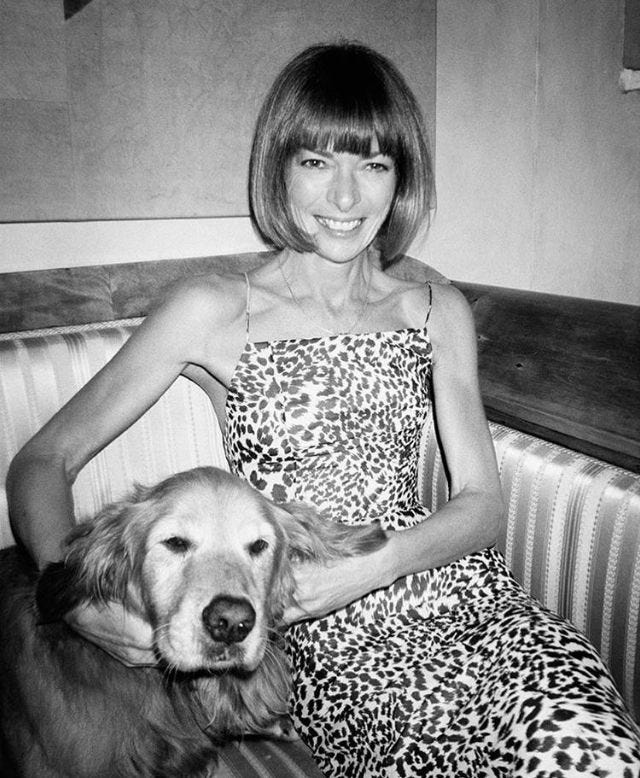Well, news fashhhh , Anna Wintour steps down as Editor in Chief after 37 years. But…….. she will continue her influence at Condé Nast as global chief content officer and Vogue’s global editorial director. According to an account published by the company, Anna told staff she wanted to help "the next generation of impassioned editors storm the field with their own ideas" as she announced her departure from the editor-in-chief role.
Revolutionizing Vogue and Fashion Media
When Wintour took the helm at Vogue, the fashion magazine world was rooted in exclusivity and tradition. Wintour quickly pivoted from traditional high-fashion-only covers to those that blended celebrity with couture. Her debut cover, featuring model Michaela Bercu in a Christian Lacroix jacket and jeans, was a clear signal: Vogue was entering a new era. This blending of high and low fashion anticipated trends that would dominate the 1990s and beyond, democratizing fashion and broadening its appeal.
Under her leadership, Vogue became the most influential fashion magazine in the world. Wintour emphasized storytelling, high production values, and editorial risk-taking. She nurtured the careers of now-legendary photographers like Annie Leibovitz and Mario Testino, and designers such as Marc Jacobs, John Galliano, and Alexander McQueen.
Championing New Talent and Cultural Influence
Wintour’s ability to spot and promote emerging talent has been central to her legacy. Through initiatives like the CFDA/Vogue Fashion Fund, she created pathways for young designers to gain visibility, mentorship, and funding. Her support helped launch the careers of numerous now-established designers and set a precedent for editor-as-tastemaker and gatekeeper.
Her annual stewardship of the Met Gala turned a museum fundraiser into one of the most-watched red-carpet events in the world, blending art, celebrity, and high fashion into a single spectacle. The event's popularity underscores her influence not just in fashion circles, but across broader pop culture.
A Complex and Controversial Figure
Wintour's leadership style—often described as icy, demanding, and exacting—has drawn both admiration and criticism. She has been portrayed as intimidating, most famously through the fictionalized Miranda Priestly in The Devil Wears Prada, a character inspired by Wintour herself. Critics have accused her of gatekeeping, promoting unrealistic beauty standards, and being slow to respond to calls for diversity and inclusion within the fashion industry.
However, in recent years, Condé Nast and Vogue under Wintour have taken more overt steps toward inclusivity, featuring more diverse voices and bodies. Whether this shift is a direct reflection of Wintour's evolving views or a response to public pressure, it demonstrates her role in shaping industry standards—even when facing resistance or scrutiny.
Well, I think her work in the beginning was amazing but over the years, regarding politics, marketing and sales pressure she involved into more restraint and celebrity driven covers. Once a beacon of fashion excellence and innovation, Vogue now often feels like it’s chasing clicks rather than setting cultural direction. The repeated spotlight on the Kardashians, whose fame is rooted more in reality TV and social media spectacle than in genuine contributions to fashion or art, signals a troubling shift. Rather than elevating fresh designers, creatives, or thought leaders, these covers feel like a retreat into formulaic celebrity worship. While Wintour once revolutionized fashion media by blending celebrity and couture in thoughtful, trendsetting ways, her recent editorial decisions feel like they pander to the algorithm, diluting Vogue’s identity and legacy in the process. It’s less about fashion and more about feeding the hype machine—something that feels beneath the magazine’s historic standards.
Anna Wintour's legacy is indelible and multifaceted. She has been a trendsetter, power broker, and cultural barometer for more than three decades. Her influence extends far beyond fashion pages into Hollywood, politics, art, and digital media. Whether celebrated for her foresight or critiqued for her exclusivity, Wintour’s imprint on fashion and media is unmatched. As fashion continues to evolve in the 21st century, her legacy will remain a benchmark against which editorial and aesthetic influence is measured.
Can’t wait to know the new editor and if there will be significant changes. What your thoughts?
xx









I stopped buying fashion magazines years ago . They stopped being about fashion.